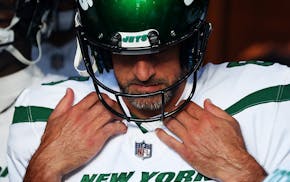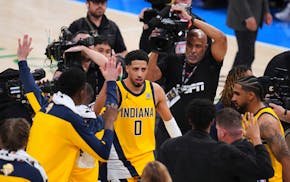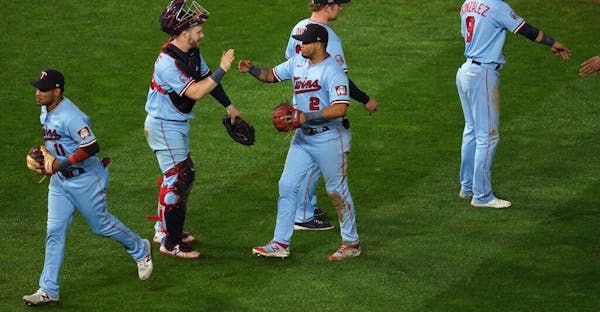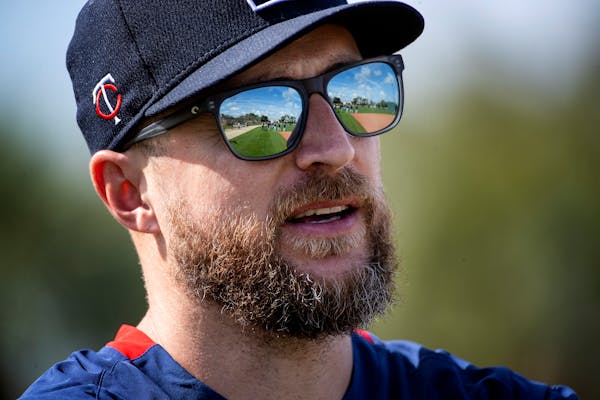It's entirely possible that the 2020 version is the best Minnesota Twins team ever assembled. It's virtually certain that it has never mattered less.
Josh Donaldson upgrades the highest-scoring offense the Twins have ever had, and tightens the infield defense. Rich Hill, Homer Bailey and Kenta Maeda give the Twins a luxury they have rarely enjoyed — competent depth in the starting rotation. In Tyler Clippard, manager Rocco Baldelli now has a true specialist in retiring tough lefthanders.
They've upgraded virtually every facet (with the exception of team speed) to a roster that won 101 games last year, in other words.
"I can't think of any team I've been involved with, ever, that's more talented than the group we have this year, I really can't," Baldelli said on the eve of the Twins' 60th Opening Day. "You can't have more talented — physically, mentally — a more talented group than what we're able to put out there. We're very fortunate."
Their timing is very unfortunate, though, because COVID-19 has wrecked their chance to prove Baldelli right, and robbed them of the setting that rewards that advantage. Their depth, their experience, their chemistry and leadership, all of it designed to flourish over a normal 162-game marathon, has been trivialized by the sheer randomness of a 60-game sprint.
Perhaps that's fitting, since the idea of playing baseball itself has been trivialized by the suffering inflicted by the coronavirus this spring and summer. MLB intends to play an improvised runt of a season, however, amid the chaos of a raging pandemic, factors that surely magnify the capriciousness of the outcome.
That's always been true of the postseason, which the Twins know firsthand: recently via an unfathomable 16-game October losing streak, but also through the World Series banner hung by the 1987 Twins and their ninth-best record. Now the regular season itself will be a helter-skelter blitz in which superior talent is advantageous but not necessarily decisive.
The Washington Nationals, after all, were just 27-33 after 60 games last season, but they recovered and won a World Series.
"Teams get hot and teams go into slumps, and you don't always know why," Baldelli said. "Avoiding losing streaks will be important."
They did it last year, never losing more than four games in a row, and opening the season with a 40-20 record. On the other hand, they were 27-33 after 60 games in 2018.
"It's a sprint, right? I do believe that the best teams will win," said Mitch Garver, who developed into a potent power hitter in 2019. "I also think that the team that gets the luckiest is the team that's going to prevail."
Luck is impossible to predict. The talent part, well, Baldelli isn't the only one who is impressed with Minnesota's assemblage.
"What we're capable of as a group is winning the World Series," said Rich Hill, who pitched in two of the past three World Series while with the Dodgers. "It's one of the best lineups in baseball. You look at a bullpen that had tremendous success last year, and [is] extremely underrated. And now looking at a rotation [headed by Jose] Berrios — the pieces of the puzzle are there to make the rotation one of the best in baseball as well.
"We're in a very good position to do some special things."
Last year's special thing was hitting home runs, 307 of them, more than any team in baseball history. The Twins allowed 48 of them, the contributions of C.J. Cron and Jonathan Schoop, to walk away last winter, but upgraded the offense by making on-base artist Luis Arraez the full-time second baseman, then signing Donaldson to the largest free-agent contract in team history.
"Our goal was to find a way to impact this team in a significant way. In Josh, we certainly found that," President of Baseball Operations Derek Falvey said upon Donaldson's agreement to a $92 million payday. "This guy is a winning baseball player through and through."
As an elite middle-of-the-order hitter, he's also a good insurance policy against regression by his new teammates, five of whom, after all, set career highs in homers. Donaldson hit 37 home runs in Atlanta last year, which makes him fit right in with his slugging teammates, but he also drew 100 walks, something no Twin since Harmon Killebrew has managed.
"He can do it all at the plate, quite simply," Baldelli said after getting a close look during spring training last March. "If you fool him, he can still do damage. And if you don't, the ball goes a long way."
Falvey was hoping to add an elite top-of-the-rotation starter to his roster last winter, but when those efforts went unfulfilled, he pivoted to a depth-and-experience strategy, bringing in Hill, Bailey and Maeda, each a mild gamble, but each with success in his recent past. Along with Michael Pineda, whose drug suspension lapses on Aug. 31, and rookies-with-résumés Devin Smeltzer and Randy Dobnak, the Twins have multiple options behind All-Stars Berrios and Jake Odorizzi.
The bullpen, too, has been addressed by signing Clippard and Sergio Romo, but the continued development of Taylor Rogers, Trevor May, Tyler Duffey and Zack Littell is what most excites Baldelli. The relief corps is "the unsung heroes" of last year's team, the manager said.
Added Berrios, the Opening Day starter for a second straight season: "We've got a few young guys like me and a few veteran guys, so that combination is going to make a great result. I say we've got a lot of energy and a lot of good expectations, so we're excited."
Expectations can be a perilous burden in the most normal of seasons, but the Twins seem happy to bear them in this most frenetic of seasons. Perhaps, though, just playing at all in 2020, with masks and social distancing and travel restrictions and empty stadiums, will someday be looked upon as a victory — if MLB manages it.
"Sixty games looks pretty good on paper, but when you go through it day by day, it gets more difficult to [see] that end of the finish line," Garver said. "It almost feels like you're waiting on bad news, right?"
For a change, in this harrowing year, the Twins hope the news turns out to be good.

RandBall: Aaron Rodgers made up his mind, and not a minute too soon

Softball state tournament: Live updates from championship games at Jane Sage Cowles Stadium


